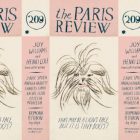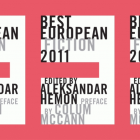Get Real! Or Maybe Don’t Get Real? A Conversation with Lincoln Michel (Part 2)
Recently, on social media, Gigantic magazine editor Lincoln Michel questioned the label of “realism.” I write “realism,” and I’m branching into other genres, so I introduced myself and asked a few more questions. Our conversation, conducted over e-mail, spanned several days, topics, and now two blog entries for Ploughshares.
Lincoln Michel’s fiction appears in Tin House, Electric Literature, Unstuck, NOON, and elsewhere. He is a co-editor of Gigantic magazine and Gigantic Worlds, a forthcoming anthology of science flash fiction. Sometimes he draws authors as monsters. He tweets at @thelincoln.
Part 1 can be found here. In Part 2, we discuss “realism” in writing workshops, shifts in the literary market, and how we both approach writing “non-realism.”
 Rebecca Meacham: Earlier in our conversation, we discussed writers who work in more than one genre. There seems to be a move in the last decade toward genre-infused work in the mainstream—and that’s welcome news.
Rebecca Meacham: Earlier in our conversation, we discussed writers who work in more than one genre. There seems to be a move in the last decade toward genre-infused work in the mainstream—and that’s welcome news.
Back in 2003 when I was shopping my first book, I was encouraged to make the stories alike to “unify” the collection. Do you think versatility—in genre, form, voice, theme—is welcomed nowadays? Established writers make genre leaps: Isabel Allende just published a murder mystery, for example. Even debut writers, like Jamie Quatro, are garnering praise for their range.
Lincoln Michel: I do think it’s more accepted—hell, almost expected—for literary writers to dip into genre these days. Colson Whitehead wrote a zombie book, Sherman Alexie wrote a YA book, Cormac McCarthy wrote a post-apocalyptic book, and so on. (I myself am finishing up an anthology of science flash fiction, coedited with Nadxieli Nieto, that got a tremendous response from literary writers and readers when we had a Kickstarter.)
At the same time, those books I mentioned tend to use a fairly established genre or subgenre where audiences are familiar with the topes and conventions. Obviously those authors, being great, subvert and complicate those conventions in interesting ways.
But it is easier for readers to swallow a literary vampire or literary wizard novel than a non-realist work that doesn’t fit neatly into an already established genre. I really don’t know if that is more accepted now or not. And I’m also not sure if readers are more accepting of a collection that combines stories in different styles or a novel that moves between styles… I hope so, because that’s my favorite stuff to write and read!
RM: All of this gets me thinking about the academy (DUH DUH DUH!) and how we teach fiction writing in undergrad and grad programs. My own education was a thousand years ago, when people were still in love with minimalists. Sign me up! I said, studying everything by Carver and Beattie. So, high on my newfound authority, I banished— banished!—certain topics in my first classes as a grad assistant: aliens, UFOs, vampires. You know, anything that wasn’t set in houses with quietly desperate people, drinking at dismal social gatherings and realizing their relationships were doomed.
And again, this might be because I went to grad school a thousand years ago, I never encountered much “unrealism” or “other than realism” by fellow students or as models in my workshops. Now, in my own teaching, I no longer ban supernatural stories in my workshops, but I’d still like more models of how to write whatever this other thing is that’s not realism, and how to do it well.
 LM: I do think this is a problem, although more so in standard high school and undergrad English classes than in MFA programs. However, my experience may be skewed since I went to Columbia where the faculty included Ben Marcus, Kelly Link, Sam Lipsyte, and other authors who don’t exactly write your cliché-quiet-domestic-realism-with-minimalist-prose-MFA-fiction category.
LM: I do think this is a problem, although more so in standard high school and undergrad English classes than in MFA programs. However, my experience may be skewed since I went to Columbia where the faculty included Ben Marcus, Kelly Link, Sam Lipsyte, and other authors who don’t exactly write your cliché-quiet-domestic-realism-with-minimalist-prose-MFA-fiction category.
I teach undergraduates and high school students, and it’s clear the students often have either not been taught how to read non-realist work and/or have been taught only to read the non-realist elements as very blunt symbolism/metaphor. Sometimes I have students tell me they don’t understand the point of a non-realist story or just can’t understand it, and then later I hear them talking about how they love Adventure Time or Game of Thrones or The Hunger Games or some other non-realist work of film or television. So this makes me think it has something to do with how “literary fiction” is taught and talked about.
I guess ultimately I just find the focus on “realism” and whether things are “realistic” or “unrealistic” in a story to be uninteresting and uninformative. Similarly, I find it mostly uninteresting to focus on what the non-real elements “mean.” It’s really enlightening—for me at least—to read and think about how the concepts of terror and the sublime inform Gothic literature, what ways “the fantastic” can complicate a story, how elements of the uncanny affect readers, and so on. I think understanding those kinds of effects is more important than debating the boundaries of genre fiction and literary fiction or what label to stick on a book—which seems like what happens these days if non-realist work comes up.
RM: What surprises me now is how many of my students want to write stories infused with ghosts and angels, dragons and cyber-anomie. I’m all for it, and yet I generally focus was on classic elements of technique. I wonder if there were other elements I can prioritize instead. How would you, or do you, instill good reading practices as well as good writing criteria for non-realism?
How this stuff should be taught is a HUGE question that I’m not sure that I could answer or am even qualified to answer. Speaking very generally, I think that both English and creative writing ignore “aesthetics” to a surprising degree. We are taught to read for political messages or cultural context, but we aren’t taught to examine the aesthetic experience of fiction. Even in creative writing classes, the focus is more on the nuts and bolts of craft than the possibilities of what these story machines can produce.
Speaking only for myself, the most interesting class I ever took in terms of shaping how I read fiction was a philosophy course called Philosophy and Literature. In my own reading, what I’m most fascinated with are the concepts I alluded to earlier: the grotesque, the fantastic (in Tzvetan Todorov’s sense of the word), the uncanny, the sublime, terror vs. horror, and so on. I’m not sure any of those terms even came up in my academic career.
RM: So, can the problems of classification and labeling ever be resolved?
 LM: I think we tend to think of genre as these discrete creatures that maybe now and then cross-pollinate—but overall we can shove an author, or at least a book, into one classification. I’m not someone who believes that genre is purely some fake marketing thing. Genre traditions and lineage are vital and important.
LM: I think we tend to think of genre as these discrete creatures that maybe now and then cross-pollinate—but overall we can shove an author, or at least a book, into one classification. I’m not someone who believes that genre is purely some fake marketing thing. Genre traditions and lineage are vital and important.
That said, that are a lot of different ways to group literature that is just as important if not more important than some surface level reading of the content. (“Does it have any fictional technology? It’s sci-fi!” “Does it have something scary? It’s horror!” etc.) I think we should be encouraging more ways to group literature and more ways to see how authors are in conversation with each other than just what self they are placed on at a bookstore.
RM: In my own writing, I was going to claim that writing non-realism is so new to me that I get stuck in the world of possibility, unable to figure out what to do next—when I realized that’s the same sticking point for my “realistic” stories. It’s called “plot,” and as it turns out, I struggle with that in any genre.
You mention that you also write what could be seen as “realist” and “non-realist” stories. Do you approach each differently? In your own work, does a story ever begin in one genre and morph into another?
LM: For the second question, definitely. And I love stories by other writers that do that! We talked about Saunders, and my favorite story of his might be “Sea Oak,” which suddenly turns into a bizarro zombie story halfway through.
I’m sure that I approach different kinds of stories differently, but I look at them from the lens of what effects and feelings I’m trying to produce. I don’t fret about how realistic a story is. If anything, I try to be even more disorienting in my “realist” work because I want people to see things in a new way. Not saying I achieve that, but it’s the goal.
Art can and should do a million things. But speaking purely for my own tastes, I want art that makes the world seem more unreal. I want fiction that can crumble the world and build it back into something new. This does not have to be done through a form of non-realism though. Many of my favorite writers—Lydia Davis, Diane Williams, Thomas Bernhard, Joy Williams, etc.—write work that is arguably realist, and yet they write with such originality (of voice, of authority, of syntax, of structure, of vision) that they cause me to see the world in new and surprising ways.



